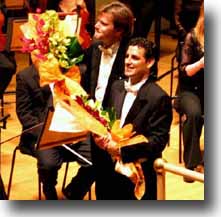This page was last updated on: October 14, 2007
REVIEWS
Concert, Cadogan Hall, London, 4 October 2007

Juan Diego Flórez and conductor Christopher Franklin
Photo courtesy of MadMusingsOfMe
Juan Diego Flórez, Cadogan Hall, SW1, The Times, 8 October 2007
Juan Diego Florez Cadogan Hall, London, The Independent, 9 October 2007
_______________________________________________________________
Juan Diego Flórez, Cadogan Hall, SW1
Neil Fisher, The Times, 8 October 2007
It's very difficult to argue with a voice like Juan Diego Flórez's. Mortal singers quake at Rossini's Cessa di più resistere, the aria that most tenors chalk up as too tricky to include in their role in The Barber of Seville. And they don't, on the whole, welcome the kind of recital programme that finishes with one of Verdi's most challenging arias Parmi veder, from Rigoletto followed by a barnstorming Donizetti lament capped by a seemingly effortless and casually floated high C.
But Flórez scampers around the minefield of bel canto like a child in a sweetshop. The eyes are winsome and puppyish; the stance open and engaging. Even his reliance on the signposting left arm a tic that he might be advised to phase out somehow seems to add to his sincerity. Certainly no one in Cadogan Hall seemed to mind: from an already respectful level of decibels at the opening number, the bravoes soon swelled to a wall-shaking level that almost had you wondering whether "London's newest concert hall" was sturdy enough to cope.
The chink in the Flórez armour is small, but it is significant. Could he be the Pavarotti of his generation? Not if his belcanto expertise doesn't eventually make way for a slightly more involving performance style and less of a reliance on a specific tranche of the operatic repertory. There were times during the first half vocal firework after vocal firework when it almost seemed that the SW1 set were appraising a wonder racehorse rather than an opera singer. Look at those sturdy high notes! The supple coloratura! The glossy coat!
But, unlike the rather one-dimensional slickness of the accompanying orchestra (the Royal Philharmonic, conducted by Christopher Franklin in no fewer than four overtures), Flórez just kept raising the bar. His Bellini a bona-fide rarity from Bianca e Fernando throbbed throughout in true cantabile tone before an astonishingly clear high D. The final Donizetti (from Linda di Chamounix) was filled with imaginative touches expert use of head voice there, heart-stopping legato here that stopped all thought of emotional monotony.
And to see the 34-year-old tackle Verdi in such thrilling fashion (including La donna è mobile, expertly wheeled out as an encore) bodes well for a future in the full lyric roles that the Pav himself excelled in. Can he inherit his mantle? The signs are good.
Juan Diego Florez Cadogan Hall, London
Kevin Brown, The Independent, 9 October 2007
On his last appearance at the Royal Opera House, the Peruvian tenor Juan Diego Florez stopped the show with his nine successive top Cs in the aria "Mes Amis" from Donizetti's La Fille du Regiment. Now, in a sold-out concert performance at the Cadogan Hall, he received a rapturous reception from those of us lucky enough to have obtained tickets.
Despite his worldwide success and the sustained applause that greeted him, Florez displayed an engaging modesty, breaking into a shy smile only when he was assured that his delivery of arias by Rossini, Bellini, Donizetti and Verdi was not only up to his own meticulous standards but had met with the approval of his audience. Florez is a master of the long-neglected art of bel canto, his light tenor voice perfectly matching his repertoire. Its lyrical power belied his slight frame, but fully complemented the elegance of his appearance.
He was accompanied by the Royal Philharmonic Orchestra, conducted by Christopher Franklin. There was an obvious rapport between singer and conductor. Nowhere was this more noticeable than during the encores, when the orchestra gave no opportunity for the singer to break into Lara's Granada, and a good-humoured Florez feigned surprise when he was finally given the cue for his vocals.
This humour is as essential a part of the appeal of Florez as the sense of vulnerability he evokes, whether in announcing that he would next sing an "unknown work" that proved to be that little- heard tune "La Donna Mobile", or pretending that he had forgotten his next encore. Yet just as readily was he able to convey the tragic emotion his arias demanded. Although very much a concert performance, the recital both showed the range of Florez's vocal ability and indicated his dramatic capabilities on the operatic stage.
The intimacy of the Cadogan Hall perfectly matched the unpretentiousness of Florez. All attention was focused on the beautiful sound that came from his mouth, though not a few ladies in the audience were just as entranced by his Latin looks.
Often, Florez is billed as the next Pavarotti, a comparison that does justice to neither man. Not only are they physically dissimilar, but their voices differ greatly. It defies imagination to visualise Pavarotti charming with humility or, for that matter, Florez dominating any setting in larger-than-life mode. The late Italian master had the heavier voice, but what Florez shares with him is the ability to entrance an audience. In this, the young Peruvian has the potential to be a superstar on his own terms.